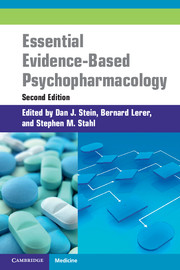
- Cited by 2
-
Cited byCrossref Citations
This Book has been cited by the following publications. This list is generated based on data provided by Crossref.
Graham, Judith 2014. Prescribing quetiapine using a medications management framework. Nurse Prescribing, Vol. 12, Issue. 2, p. 81.
Dobrovolsky, Alexander Ichim, Thomas E. Ma, Daqing Kesari, Santosh and Bogin, Vladimir 2017. Xenon in the treatment of panic disorder: an open label study. Journal of Translational Medicine, Vol. 15, Issue. 1,
- Publisher:
- Cambridge University Press
- Online publication date:
- August 2012
- Print publication year:
- 2012
- Online ISBN:
- 9780511910395
- Subjects:
- Psychiatry and Clinical Psychology, Medicine, Psychiatry


